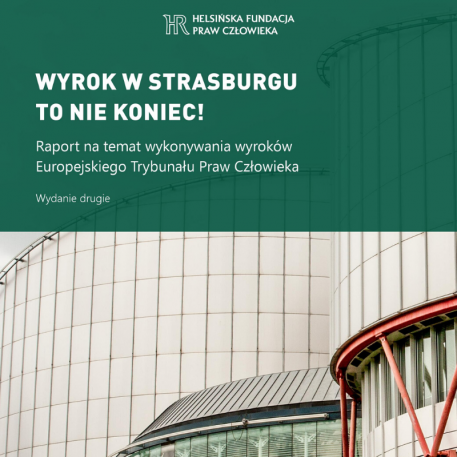
A Strasbourg judgment is not the end – second edition of a report on the execution of ECtHR judgments
The Helsinki Foundation for Human Rights has published the second edition of its report on the execution of judgments handed down by the European Court of Human Rights.
A Strasbourg judgment is not the end
Following the delivery of a judgment by the European Court of Human Rights, the Council of Europe’s Committee of Ministers takes on the supervision of the judgement’s execution. It is the Committee that receives national authorities’ action plans in which they present the measures implemented to execute the judgment at the general level, such as legislative changes, changes in the practice of individual government bodies, educational or awareness-raising activities. These measures aim to prevent similar infringements in future and thus reduce the number of applications submitted to the Court on the same subject. Once the action has been implemented, a national authority submits a report to the Committee, requesting that the judgment be declared enforceable. Based on the authority’s report, the Committee of Ministers decides to close the case, or obliges the state to initiate additional measures. In the course of the Committee proceedings, communications may also be submitted by non-governmental organisations.
Non-executed judgments: an unresolved problem
The recently updated report presents many ECtHR judgments relevant to human rights and freedoms that are yet to be fully implemented by national authorities. Notably, the Committee of Ministers currently supervises Poland’s execution of ca. 100 judgments of the Strasbourg Court. These non-executed judgments concern a variety of important issues such as the prohibition of torture, inhuman or degrading treatment or punishment, the right to a fair trial, personal freedom and freedom of expression.
The report focuses on ECtHR judgments delivered in recent years. The Foundation described, among other things, the rulings in cases Adamkowski and Parol, which concern violations of the right to a fair trial resulting from the courts’ excessively formalistic interpretation of laws, as well as the failure to provide the applicants, who are deprived of their liberty and appear as parties to civil proceedings, with appropriate instructions on the rules governing submissions of appeals. The Foundation also recalled the judgment in the case Rybicka and Solska, which involves the challenge brought by close relatives of victims of the Smolensk catastrophe against the exhumation of their loved ones’ remains. The HFHR has indicated that the full execution of these judgments requires legislative reforms.
The report also highlights that according to the Council of Europe’s Committee of Ministers, Polish authorities are yet to take measures sufficiently implement the ECtHR judgment of July 2015 entered in the case of Rutkowski v. Poland, which concerns the excessive length of court proceedings. The Foundation shares the view that this problem has not yet been solved and that the statutory complaint against the excessive length of proceedings has not been effective enough.
Next Committee’s meeting
As early as in December, the CoE Committee of Ministers will once again review Council of Europe members’ implementation of the guidelines laid down in Strasbourg judgments. This time the Committee’s agenda included the Grabowski judgment, a case concerning juvenile justice and placement in a youth detention institution.


19.11.2019
 Cookies EN
Cookies EN